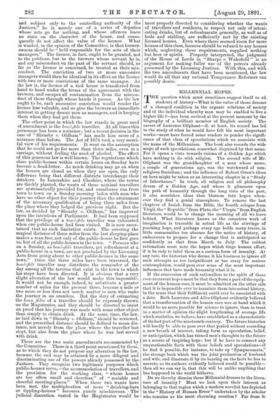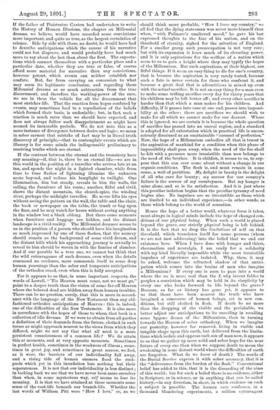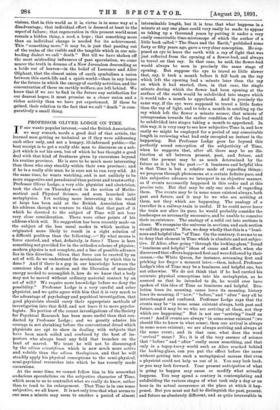MILLENNIAL HOPES. T HE question which must sometimes suggest itself to
all students of history—What is the value of those dreams of a changed condition in the organic relations of society and of the individual whereby man may be enabled to live a higher life P—has been revived at the present moment by the biography of a brilliant member of English society. The career of Laurence Oliphant—if, at least, its record has led to the study of what he would have felt his most important works—must have forced some readers to ponder the signifi- cance of that class of speculations which we associate with the name of the Millennium. The book also records the wide scope of such speculations, somewhat disguised by that name. For it opens a vista towards visions of a Golden Age which have nothing to do with religion. The second wife of Mr. Oliphant was the granddaughter of a man whose name, a couple of generations ago, was the watchword of non- religious Socialism ; and the influence of Robert Owen's ideas on hers might be taken as an interesting chapter in a " Study of Inheritance." In truth, all religion and all philosophy dream of a Golden Age, and where it glimmers upon the path of humanity through the long vista of the past, it also nourishes ideas that blossom into hopes when- ever they find a genial atmosphere. To remove the last chapters of Isaiah from the Bible, the fourth eclogue from Virgil, the " Republic " from Plato, the " Utopia " from English literature, would be to change the meaning of all we leave behind. What literature knows as the conscious work of imagination is traceable in actual life as the stirrings of yearning hope, and perhaps every age holds many traces, in little communities too obscure for the notice of history, of endeavours to prepare for a change that is anticipated as confidently as that from March to July. The coldest rationalism must note the hopes which tinge human effort, if it be only to label them as a curious form of insanity. At any rate, the historian who deems it his business to ignore all such attempts as too insignificant or too crazy for serious contemplation, would pass over some of the most important influences that have made humanity what it is.
If the concession of such rationalism to the spirit of these ever-recurrent hopes must be that they form a part of the equip- ment of the human race, it must be admitted on the other side that it is impossible ever to translate them into actual history, in the sense that their fulfilment could ever be associated with a date. Both Laurence and Alice Oliphant evidently believed that a transformation of the human race was at hand which it would be no more possible for science to ignore, than to treat as a matter of opinion the slight lengthening of average life which statistics, we believe, have established as a characteristic of the last part of the nineteenth century. The future historian will hardly be able to pass over that period without recording a new breath of interest, taking form as speculation, belief, or anticipation, which has turned men's thoughts to the future as a source of inspiring hope ; but if he have to connect any unquestionable facts with these beliefs and speculations—if he find it possible, for instance, to take up " Sympneumata," the strange book which was the joint production of husband and wife, and illustrate it by its bearing on the facts he has to narrate, as its authors evidently believed would be possible— then all We can say is, that this will be nnlike anything that has happened in the world hitherto.
Do we thereby dismiss these Millennial dreams to the litera- ture of insanity P Must we look upon their interest as belonging to that region which a modem novelist has depicted in the "History of Human Error" undertaken by the scholar who remains as his most charming creation P Far from it. If the father of Pisistratns Caxton had undertaken to write the History of Human Illusions, the chapter on Millennial dreams, we believe, would have recorded some convictions more important, and quite as true, as the largest certainties of science. Side by side with these, no doubt, he would have bad to describe anticipations which the course of his narrative could not but disprove, and would probably have had much more to say about the last than about the first. The expecta- tions which connect themselves with a particular place and a particular date, whether they are true or false, of course afford more material for narrative than any convictions, however potent, which events can neither establish nor confute. Bat, far from carrying on concession to what may seem its legitimate conclusion, and regarding these Millennial dreams as so much subtraction from the true discernment, and therefore the working-power of the race, we see in them the vehicle for all the discernment that most enriches life. That the reaction from hopes confuted by events, may sometimes lead to a repudiation of the beliefs which formed their basis, is undeniable ; but, in fact, such a reaction is much rarer than we should have expected, and does not always follow such disappointment as might have seemed its inexorable prelude. We do not note this as a mere instance of divergence between desire and logic ; we mean in sober earnest that mistake of fact may be in literal truth discovery of principle,—that to contemplate events which are illusory is for some minds the indispensable preliminary to receiving truths which are eternal.
If the contrast between the eternal and the transitory have any meaning—if, that is, there be an eternal life—we are in this world in the position of a traveller who arrives late at an inn, and spends the night in a lighted chamber, while from time to time flashes of lightning illumine the unknown scene beyond, and reduce his lamplight to twilight. One illumination, dim but steady, reveals to him the walls, the • ceiling, the furniture of his room ; another, fitful and vivid, shows the distant mountain, the church-spire, the winding river, perhaps the midnight traveller. He never lifts his eyes without seeing the pattern on the wall, the table and the chair, the book or newspaper on the table, the trunk or bag upon the floor, and he may watch for hours without seeing anything in the window but a black oblong. But there come moments when furniture and baggage are hidden, and the distant landscape is a vivid reality. The Millennial dreamer seems to us in the position of a person who should have his imagination so much impressed by one of these flashes, that the scenery should remain as the background of some vivid dream, and the distant hills which his approaching journey is actually to reveal to him should be woven in with the fancies of slumber. And if our parable be a true one, we cannot but think that the wild extravagance of such dreams, even when the details command no credence, more commends itself to some deep human yearnings than the sober and temperate anticipations of the orthodox creed, even when this is folly accepted.
For it appears to us that, in some important respects, the words of Lowell, " 'Tis Heaven must come, not we must go," point to a deeper truth than the vision of some far-off Heaven where the beloved dead are hidden away from human troubles. There can be no question, surely, that this is more in accord- ance with the language of the New Testament than any old- fashioned orthodox anticipations of Heaven : this is, indeed, one of the difficulties of the New Testament. It is also more in accordance with the hopes of those to whom that book is a collection of idle dreams. If we were to obtain from all parties a definition of their demands from the future, clothed in such terms as might approach nearest to the views from which they differed, might we not say that what all need is a more persistent consciousness of a common life ? We do attain this at moments, and at very opposite moments. Sometimes in perfect health, sometimes in the weakness of illness ; some- times in great joy, and sometimes in great sorrow, we feel, as it were, the barriers of our individuality fall away, and a rising tide of human oneness flood the rock- pools which yet in this inundation lose nothing but their separateness. It is not that our individuality is less distinct ; in looking back we see that we have never been more ourselves than when, in some mysterious way, self seems to lose its meaning. It is that we have attained at these moments some sense of the root-life beneath our branch-life. Whether the last wordi of William Pitt were "How I love," or, as we should think more probable, " How I leave my country," we all feel that the dying statesman was never more himself than when, " with Palinure's unaltered mood," he gave his last expressed thoughts to the fate of his nation, and on the threshold of eternity, sighed for the salvation of England. For a smaller group such preoccupation is not very rare; but with its expansion it loses much of its elevating power, and it is only aspirations for the welfare of a nation which • seem to us to gain a height where they may typify the hopes of the Millennium. But such aspirations, at their highest, are fitful things. If it seem an easy thing to die for one's country, that is because the aspiration is very rarely tested, because such a fate is never certain for those who confront it, and because a great deal that is adventitious is mixed up even with the actual sacrifice. It is not an easy thing for a man even to make some trifling sacrifice every day for thirty years that his children may be left better off ; and every other sacrifice is harder than that which a man makes for his children. And difficulty, if it passes into ease at one end, passes into impossi- bility at the other; there are sacrifices we should wish to make for all which we cannot make for our dearest. Where this is ignored, we are certain it is because the whole question of sacrifice has passed into an unreal region, and a standard is adopted for all exhortation which in practical life is uncon- sciously dismissed as an unattainable " counsel of perfection." Now, the hope of a Millennium embodies all that is truest in the aspiration of mankind for a condition when this phase of impossibility shall pass away, when the need of the foe shall be felt with a pressure more irresistible than now belongs to the need of the brother. It is childish, it seems to us, to sup- pose that this can ever come about without a change in our organic conditions. The flesh is, and must remain in some sense, a wall of partition. My delight in beauty is the delight of all who care for beauty ; my sorrow for our country's failure is the sorrow of my countrymen. But my hunger is mine alone, and so is its satisfaction. And it is just where this peculiar isolation begins that the peculiar tyranny of need begins also. No impulses are so irresistible as those which are limited to an individual experience,—in other words, as those which belong to the world of sensation.
Hence the hope of a better world, whatever form it takes, must always in logical minds include the hope of changed con- ditions of our physical being. When such a world is placed beyond the grave, our strictly physical being is left behind. It is the fact that we drop the limitations of self on that threshold, which translates itself for some persons (whom we are not now addressing) into the belief that we end our existence here. When I have done with hunger and thirst, rheumatism and neuralgia, I am ready for a solidarity with my kind literally impossible while the most irresistible impulses of experience are isolated. Why, then, it may be asked, welcome the refracted shadow of that antici- pation which comes into the brains of men who imagine a Millennium ? If every one is soon to pass into a world where the we is more real than the I, why invent fables to perplex a conviction which may be held in its simplicity by every one who looks forward to life beyond the grave P Because, as far as history has gone yet, it appears to us that those have been nearest the truth who have imagined a concourse of human beings, set in new con- ditions, but still clothed in flesh. If death be no more than the dropping of the visible and the perishable, we better adjust our anticipations to its unveiling in recalling some bygone dream of the Millennium, than in turning towards the Heaven of sober orthodoxy. When we imagine our posterity, however far removed, living in visible and tangible shape upon this earth, but delivered from the limita- tions which isolate and oppress each son of man now, it appears to us that we gather up more solid and sober hope for the near future of every one than when we suppose death to mean the awakening in some distant world where the difficulties of earth are forgotten. What do we know of death P The words of the Burial Service express it with sober accuracy, that it is the " deliverance from the burden of the flesh." Conventional belief has added to this, that it is the discarding of the aims of this world; but for such a belief there is no evidence, either in Scripture, or in science, or in anything that can be called history,—in any direction, in short, in which evidence on such a subject is possible. The human race confesses, in a thousand blundering experiments, a million extravagant
-visions, that in this world as it is, virtue is in some way at a disadvantage; that individual effort is doomed at least to the aspect of failure ; that regeneration in this present world must remain a hidden thing, a seed, a hope ; that something more than an individual change is needed for its achievement. This "something more," it may be, is just that passing out of the realm of the visible and the tangible which in our mis- leading dialect we call" death." But till we have shaken off the most misleading influences of past speculation, we come nearer the truth in dreams of a New Jerusalem descending as a bride out of heaven—in the belief of Laurence and Alice Oliphant, that the closest union of earth symbolises a union between this earth-life and a spirit-world—than in any hopes for the future in which the energy of earthly activities, and the concentration of these on earthly welfare, are left behind. We know that if we are to find in the future any satisfaction for our dearest hopes, it must promise us a closer union and a richer activity than we have yet experienced. If these be gained, their relation to the fact that we call " death " is com- paratively a small thing.




































 Previous page
Previous page